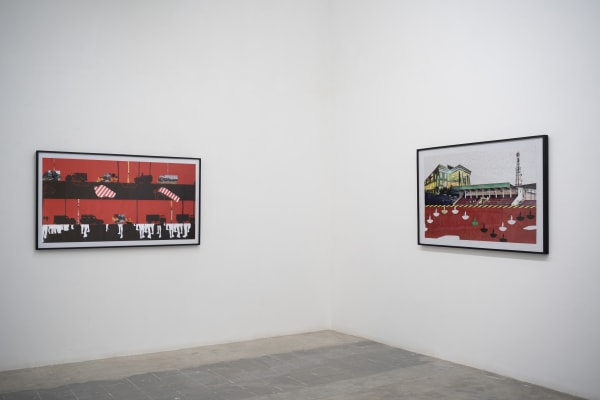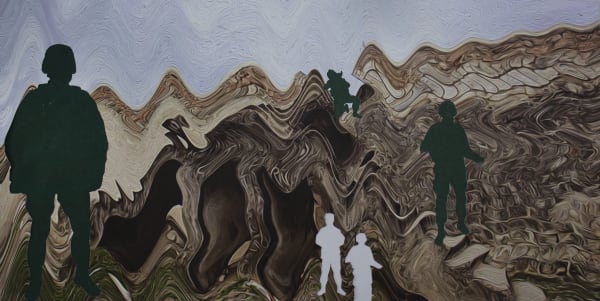Unspoken: Kanesh Thabendran
Unspoken oscillates between documentation and commentary. Kanesh Thabendran offers a journalistic insight into the changing political, social and economic environment of Northern Sri Lanka through a combination of techniques that permit him to alternate between truths: self-evident, perceived and imagined. The artist employs a combination of digital manipulation, photo-cutting and collage techniques to alter photographs, and in the process attempts to spell out realities that would otherwise remain unnoticed and forgotten.
Bullets, helmets, and tombstones appear in Thanbendran’s work with a persistent multiplicity, serving as a haunting reminder of the countless deaths and constant military presence. Images of places with historical and touristic interest are warped and distorted, as they become sites of traumatic memory. The clipart-like quality in the artist's work underscores the mundane frequency and constant presence of the conflict with a subversive irony. It comments on a scathing reality that has become a way of existence.
Altering and transforming the original image by incorporating cut outs from other photographs becomes a way through which the artist provides additional context than that which meets the eye. Weaving in strips cut out from photographs, on the other hand, allows the artist to present parallel and interconnected images with an obscurity that comments on years of unresolved issues.
Thabendran’s work attempts to challenge existing narratives. Through his work, the artist notes the shortsightedness of developmental projects initiated in the region since the end of the Civil War. His work questions their motivation, and the extent to which the interests of the local inhabitants have been taken into consideration. Furthermore, it comments on issues that have continued to persist for years without a sight of resolution.
Unspoken is an objective take by the artist on the relationship dynamics between the state and the people in Sri Lanka’s North. Informed by the lingering memories of Sri Lanka's Civil War and acute observation of the impact of state intervention, Thabendran's work offers alternative perspectives, offering insight into experiences that are as personal as it is collective.
-
 Kanesh ThabendranHome, 2023Mixed Media on Paper31 cm x 45 cm
Kanesh ThabendranHome, 2023Mixed Media on Paper31 cm x 45 cm
12 1/4 x 17 3/4 in -
 Kanesh ThabendranGloomy II, 2023Mixed Media on Paper76cm x 121 cm
Kanesh ThabendranGloomy II, 2023Mixed Media on Paper76cm x 121 cm
29 7/8 x 47 5/8 in -
 Kanesh ThabendranWeaving II, 2023Mixed Media on Paper21cm x 14 cm
Kanesh ThabendranWeaving II, 2023Mixed Media on Paper21cm x 14 cm
8 1/4 x 5 1/2 in -
 Kanesh ThabendranWeaving IV, 2023Mixed Media on Paper30cm x 21 cm
Kanesh ThabendranWeaving IV, 2023Mixed Media on Paper30cm x 21 cm
11 3/4 x 8 1/4 in
-
 Kanesh ThabendranTrace, 2023Mixed Media on Paper31 cm x 45 cm
Kanesh ThabendranTrace, 2023Mixed Media on Paper31 cm x 45 cm
12 1/4 x 17 3/4 in -
 Kanesh ThabendranConvey, 2023Mixed Media on Paper76 x 183 cm
Kanesh ThabendranConvey, 2023Mixed Media on Paper76 x 183 cm
29 7/8 x 72 in -
 Kanesh ThabendranTranspose, 2023Mixed Media on Paper31 x 61 cm
Kanesh ThabendranTranspose, 2023Mixed Media on Paper31 x 61 cm
12 1/4 x 24 in -
 Kanesh ThabendranCapture, 2023Mixed Media on Paper33cm x 91 cm
Kanesh ThabendranCapture, 2023Mixed Media on Paper33cm x 91 cm
13 x 35 7/8 in













